Ward A.W. The Cambridge History of British Foreign Policy. 1783-1919. Volume 3
Подождите немного. Документ загружается.

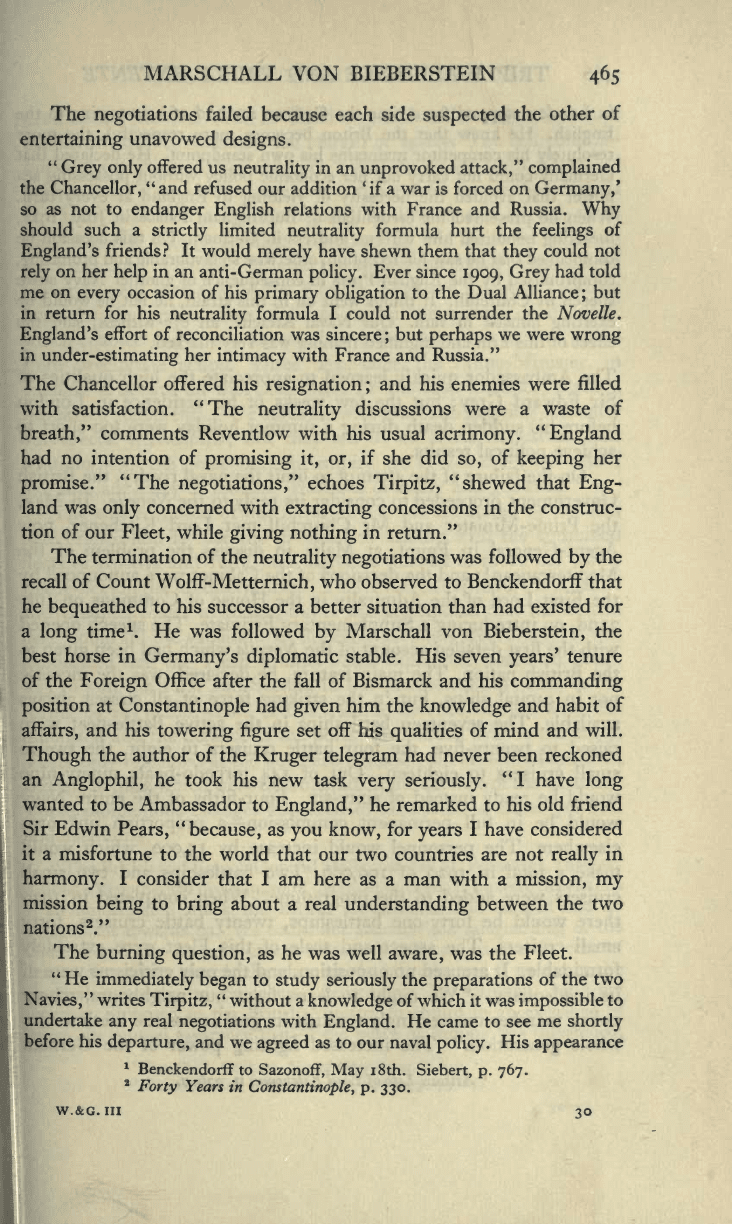
MARSCHALL VON BIEBERSTEIN
465
The
negotiations
failed
because each side
suspected
the
other
of
entertaining
unavowed
designs.
11
Grey only
offered us
neutrality
in an
unprovoked
attack,"
complained
the
Chancellor,
"
and
refused our addition
'
if a war is forced
on
Germany/
so
as not
to
endanger
English
relations
with
France
and Russia.
Why
should such a
strictly
limited
neutrality
formula hurt the
feelings
of
England's
friends? It
would
merely
have shewn
them
that
they
could
not
rely
on
her
help
in
an
anti-German
policy.
Ever since
1909,
Grey
had told
me on
every
occasion of
his
primary obligation
to
the Dual
Alliance;
but
in
return
for
his
neutrality
formula I
could
not
surrender
the Novelle.
England's
effort
of
reconciliation was
sincere;
but
perhaps
we were
wrong
in
under-estimating
her
intimacy
with
France
and
Russia."
The
Chancellor
offered
his
resignation
;
and
his enemies
were
filled
with
satisfaction. "The
neutrality
discussions were
a
waste
of
breath,"
comments Reventlow with
his
usual
acrimony.
"England
had no
intention
of
promising
it,
or,
if
she
did
so,
of
keeping
her
promise."
"The
negotiations,"
echoes
Tirpitz,
"shewed that
Eng-
land was
only
concerned
with
extracting
concessions in
the
construc-
tion
of our
Fleet,
while
giving
nothing
in
return."
The
termination
of
the
neutrality
negotiations
was
followed
by
the
recall
of Count Wolff-
Metternich,
who
observed to
Benckendorff that
he
bequeathed
to his
successor
a
better situation
than
had existed
for
a
long
time
1
. He was followed
by
Marschall von
Bieberstein,
the
best horse
in
Germany's
diplomatic
stable.
His
seven
years'
tenure
of
the
Foreign
Office
after the
fall of Bismarck and his
commanding
position
at
Constantinople
had
given
him
the
knowledge
and habit
of
affairs,
and his
towering figure
set
off his
qualities
of mind
and will.
Though
the author
of
the
Kruger telegram
had
never been
reckoned
an
Anglophil,
he
took
his new
task
very seriously.
"I
have
long
wanted
to
be
Ambassador
to
England,"
he remarked to
his
old friend
Sir Edwin
Pears,
"because,
as
you
know,
for
years
I
have
considered
it
a
misfortune to the world
that
our
two
countries
are not
really
in
harmony.
I
consider
that
I
am here as a man
with
a
mission,
my
mission
being
to
bring
about
a
real
understanding
between
the two
nations
2
."
The
burning question,
as he was well
aware,
was the
Fleet.
"
He
immediately
began
to
study seriously
the
preparations
of
the two
Navies,"
writes
Tirpitz,
"
without
a
knowledge
of
which it
was
impossible
to
undertake
any
real
negotiations
with
England.
He came
to see
me
shortly
before
his
departure,
and
we
agreed
as to
our naval
policy.
His
appearance
1
Benckendorff
to
Sazonoff,
May
18th.
Siebert,
p. 767.
2
Forty
Years
in
Constantinople,
p. 330.
w.&g.
in
30

466
TRIPLE
ALLIANCE
AND
TRIPLE
ENTENTE
in London
stopped
for
a time
the German
method of
kow-towing
to
the
English.
He knew that
the Briton
becomes
more
respectful,
the more
resolutely
his
competitor
maintains
his
own
standpoint.
He declared
that
Germany
could
not
carry
out her
economic
policy
without
possessing
sea
power
that
avoided the
necessity
of
yielding
to
England
at
every
turn.
When
he
presented
his
credentials at
Buckingham
Palace
in
July, 191
2,
the
King
honoured him
with an
address
in
German. On this occasion
he
complained
that he saw his
reception,
otherwise so
favourable
and
promising,
compromised
by
the
English
Press
in
consequence
of
another
Navy
scare
speech
by
Churchill.
If
things
went on in
this
strain,
he felt he would be
exerting
himself in
vain. Our
Naval
Attache,
an
eye-witness,
said the
effect
of
this firm and
dignified
manner was
very
marked."
The
Ambassador
quickly
learned
to
appreciate
the
high
qualities
of
Sir
Edward
Grey;
but the few
weeks
of
his residence in
London
before his
sudden death
during
a
summer
holiday
were too short to
achieve
political
results.
On
the failure of
the
attempt
to limit the naval
rivalry,
the British
Government
proceeded
to
consider
its
reply
to
the
Novelle.
In
May,
the
Prime-Minister
and Mr Churchill
met Lord
Kitchener,
now
Agent-
General in
Egypt,
at
Malta
to
discuss
the
problem
of
the
Mediterranean
1
;
and
the
decisions of
the Cabinet
were announced
by
the
First
Lord
of the
Admiralty
in
the
House of Commons on
July
22nd,
on
introducing
a
Supplementary
Estimate.
The
speech opened
with the
first detailed account
of
the
Novelle which had been
given
to
the
British nation. The main
feature,
he
declared,
was
the
increase
not
in
capital ships,
but
in
the
striking
force
of all
classes
always
available. The
seventeen
battleships
in
the active Battle-fleet
were
raised
to
twenty-five,
the
four
battle
cruisers
to
eight,
the twelve
small
cruisers
to
eighteen.
Out
of
144
torpedo-boats
ninety-nine
would
be
ready
instead
of
sixty-six.
Four-fifths
of
the
entire
Navy
would
be
in full
permanent
commission
—
a
proportion
unknown
elsewhere.
The
personnel
would increase
by 15,000,
which
would
make a
total
in
1920
of
100,000.
Two
battleships
and
two small
cruisers were added
to the
programme.
When
completed
in
1920
there
would
be
forty-one
battleships, twenty
battle
cruisers,
forty
small cruisers.
The
aspect
and
scale
of
this Fleet were
extremely
formidable. It aroused
no
opposition,
and
the
only
criticisms
were
of
its
inadequacy.
"We
ought
to
learn
from our
neighbours,
whose
policy
marches
unswervingly
towards
its
goal
across
the
lifetime
of
a
whole
generation/
'
The
increased
fighting
power
of
the
German
1
Arthur,
Life of
Lord
Kitchener,
11.
336-7.
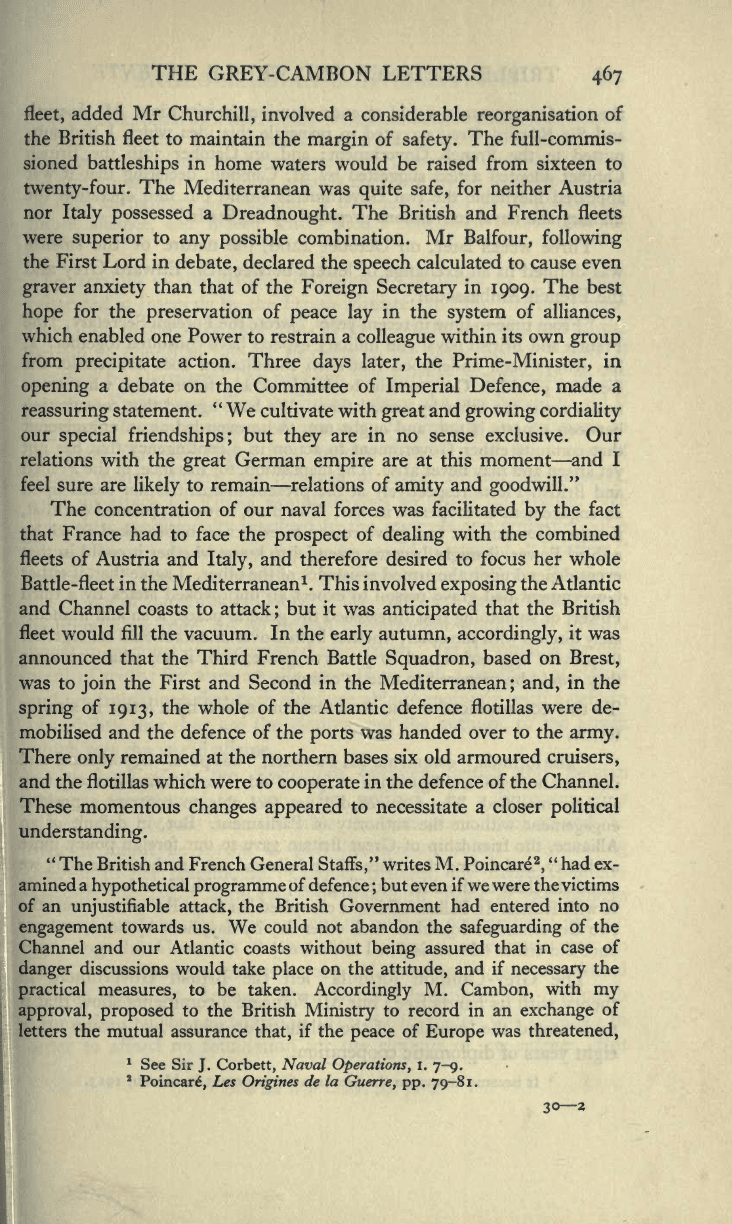
THE
GREY-CAMBON LETTERS
467
fleet,
added Mr
Churchill,
involved a considerable
reorganisation
of
the
British
fleet to
maintain
the
margin
of
safety.
The
full-commis-
sioned
battleships
in
home
waters
would be raised
from
sixteen
to
twenty-four.
The
Mediterranean was
quite
safe,
for
neither
Austria
nor
Italy
possessed
a
Dreadnought.
The British
and
French
fleets
were
superior
to
any possible
combination.
Mr
Balfour,
following
the First
Lord
in
debate,
declared
the
speech
calculated to cause even
graver
anxiety
than
that
of
the
Foreign Secretary
in
1909.
The
best
hope
for
the
preservation
of
peace lay
in
the
system
of
alliances,
which
enabled
one Power
to
restrain
a
colleague
within its
own
group
from
precipitate
action. Three
days
later,
the
Prime-Minister,
in
opening
a
debate
on
the
Committee
of
Imperial
Defence,
made
a
reassuring
statement. "We cultivate with
great
and
growing cordiality
our
special friendships;
but
they
are
in no sense exclusive. Our
relations with the
great
German
empire
are at this
moment
—
and
I
feel
sure are
likely
to remain
—
relations
of
amity
and
good
will.'
'
The
concentration
of our naval forces was facilitated
by
the fact
that France had
to
face
the
prospect
of
dealing
with the combined
fleets
of
Austria and
Italy,
and
therefore desired
to
focus her
whole
Battle-fleet
in
the Mediterranean
1
.
This
involved
exposing
the Atlantic
and
Channel coasts to attack
;
but
it
was
anticipated
that
the
British
fleet
would fill
the
vacuum. In
the
early
autumn,
accordingly,
it
was
announced
that the
Third
French Battle
Squadron,
based
on
Brest,
was
to
join
the First
and
Second
in
the
Mediterranean;
and,
in
the
spring
of
1913,
the
whole of
the Atlantic defence
flotillas
were de-
mobilised and
the defence
of
the
ports
was handed over
to the
army.
There
only
remained at the northern bases
six old armoured
cruisers,
and
the flotillas which were to
cooperate
in
the defence
of the
Channel.
These
momentous
changes
appeared
to
necessitate
a closer
political
understanding.
"
The British and
French General
Staffs,"
writes
M. Poincare
2
,
"
had ex-
amined a
hypothetical
programme
of
defence
;
but even
if
wewere
the
victims
of an
unjustifiable
attack,
the
British
Government
had entered
into
no
engagement
towards
us. We
could
not
abandon the
safeguarding
of the
Channel
and
our
Atlantic coasts
without
being
assured
that
in case
of
danger
discussions
would take
place
on the
attitude,
and
if
necessary
the
practical
measures,
to
be taken.
Accordingly
M.
Cambon,
with
my
approval,
proposed
to the British
Ministry
to record
in an
exchange
of
letters
the
mutual
assurance
that,
if
the
peace
of
Europe
was
threatened,
1
See Sir
J. Corbett,
Naval
Operations,
I.
7-9.
2
Poincar£,
Les
Origines
de la
Guerre,
pp. 79-81.
30
—
2
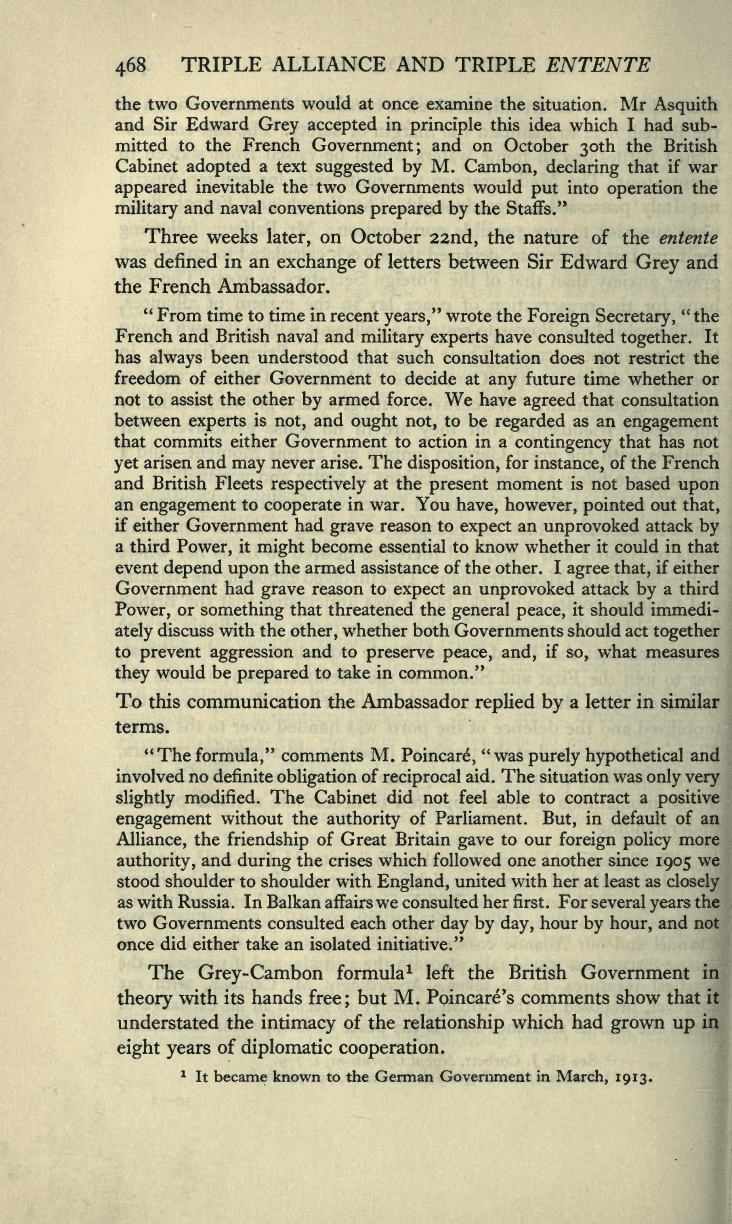
468
TRIPLE
ALLIANCE AND
TRIPLE
ENTENTE
the
two Governments
would at
once
examine the
situation. Mr
Asquith
and
Sir Edward
Grey accepted
in
principle
this
idea
which
I had sub-
mitted
to the French
Government;
and on
October
30th
the
British
Cabinet
adopted
a
text
suggested by
M.
Cambon,
declaring
that if war
appeared
inevitable the two
Governments would
put
into
operation
the
military
and
naval conventions
prepared
by
the
Staffs."
Three weeks
later,
on
October
22nd,
the nature of
the
entente
was defined
in an
exchange
of
letters
between
Sir
Edward
Grey
and
the
French
Ambassador.
"
From
time to time in
recent
years,"
wrote the
Foreign Secretary,
"
the
French and British naval and
military
experts
have consulted
together.
It
has
always
been understood that
such
consultation does not restrict
the
freedom
of
either Government to
decide at
any
future time whether
or
not to assist the other
by
armed
force.
We
have
agreed
that
consultation
between
experts
is
not,
and
ought
not,
to
be
regarded
as
an
engagement
that commits either
Government to action
in a
contingency
that
has
not
yet
arisen and
may
never
arise. The
disposition,
for
instance,
of the
French
and British Fleets
respectively
at
the
present
moment
is not based
upon
an
engagement
to
cooperate
in
war.
You
have,
however,
pointed
out
that,
if
either Government had
grave
reason to
expect
an
unprovoked
attack
by
a third
Power,
it
might
become
essential
to know
whether it could
in
that
event
depend upon
the armed
assistance
of
the
other.
I
agree
that,
if
either
Government
had
grave
reason
to
expect
an
unprovoked
attack
by
a third
Power,
or
something
that threatened the
general peace,
it
should immedi-
ately
discuss with the
other,
whether both
Governments
should
act
together
to
prevent aggression
and to
preserve peace,
and,
if
so,
what measures
they
would be
prepared
to take
in
common."
To
this communication
the
Ambassador
replied by
a
letter
in
similar
terms.
"The
formula,"
comments
M.
Poincare,
"was
purely hypothetical
and
involved
no
definite
obligation
of
reciprocal
aid. The situation was
only very
slightly
modified. The Cabinet
did
not feel able to contract
a
positive
engagement
without
the
authority
of Parliament.
But,
in default of an
Alliance,
the
friendship
of
Great
Britain
gave
to our
foreign policy
more
authority,
and
during
the crises
which followed one another since
1905
we
stood shoulder to
shoulder
with
England,
united
with
her at least
as
closely
as
with Russia.
In Balkan
affairs we
consulted her
first.
For several
years
the
two Governments
consulted each other
day
by day,
hour
by
hour,
and not
once
did
either take an
isolated
initiative."
The
Grey-Cambon
formula
1
left the British Government
in
theory
with its
hands
free;
but
M. Poincare's comments
show
that
it
understated
the
intimacy
of
the
relationship
which
had
grown
up
in
eight
years
of
diplomatic
cooperation.
1
It
became
known
to
the
German Government
in
March, 191 3.
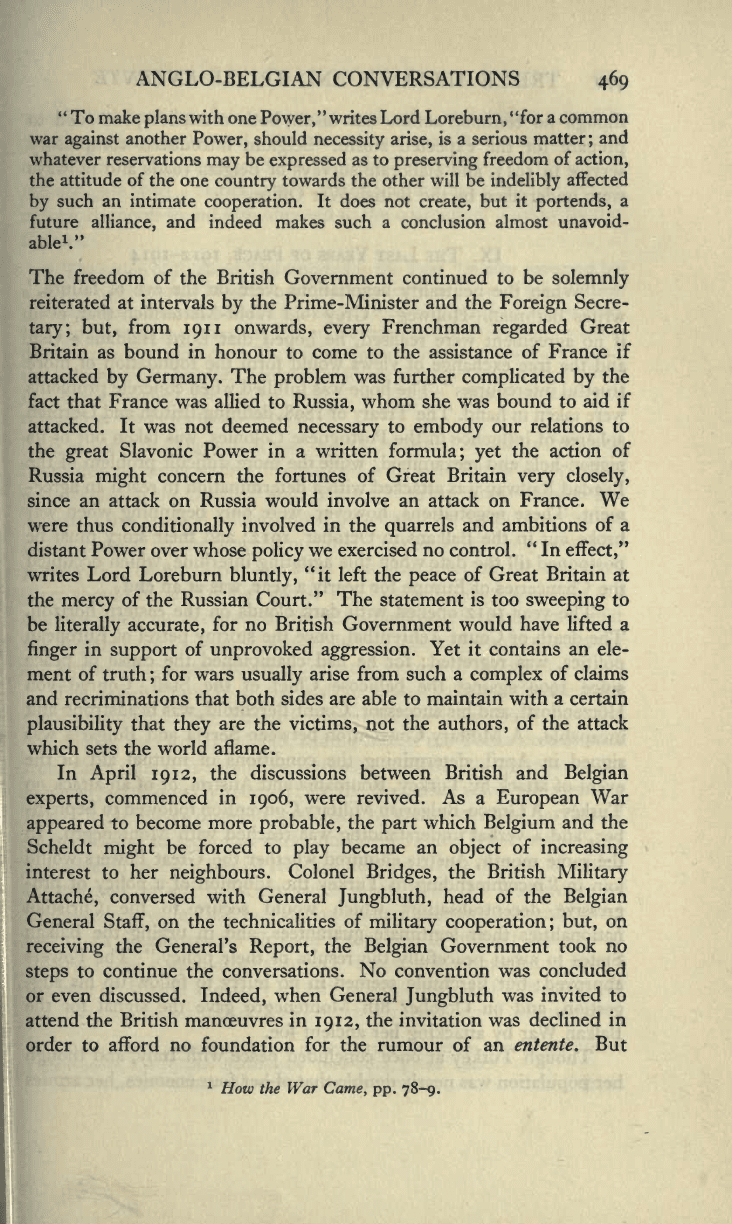
ANGLO-BELGIAN CONVERSATIONS
469
11
To make
plans
with
one
Power,"
writes Lord
Loreburn/'for
a common
war
against
another
Power,
should
necessity
arise,
is
a
serious
matter;
and
whatever reservations
may
be
expressed
as to
preserving
freedom
of
action,
the attitude
of
the
one
country
towards the other will be
indelibly
affected
by
such an
intimate
cooperation.
It does
not
create,
but it
portends,
a
future
alliance,
and
indeed
makes such a
conclusion
almost unavoid-
able
1
."
The
freedom
of
the British Government
continued
to
be
solemnly
reiterated
at
intervals
by
the Prime-Minister
and
the
Foreign
Secre-
tary;
but,
from
191
1
onwards,
every
Frenchman
regarded
Great
Britain
as bound in
honour
to
come
to the assistance
of
France
if
attacked
by
Germany.
The
problem
was
further
complicated by
the
fact
that
France was allied
to
Russia,
whom she was
bound
to
aid if
attacked.
It
was
not
deemed
necessary
to
embody
our
relations
to
the
great
Slavonic Power
in a
written
formula;
yet
the action
of
Russia
might
concern
the fortunes
of Great Britain
very
closely,
since an
attack
on Russia would involve
an
attack
on France.
We
were
thus
conditionally
involved
in
the
quarrels
and
ambitions
of a
distant Power over
whose
policy
we exercised
no
control.
"
In
effect,"
writes
Lord
Loreburn
bluntly,
"it left
the
peace
of Great Britain
at
the
mercy
of
the
Russian
Court."
The
statement
is
too
sweeping
to
be
literally
accurate,
for
no
British
Government
would
have
lifted
a
finger
in
support
of
unprovoked
aggression.
Yet
it contains
an ele-
ment
of
truth
;
for wars
usually
arise from such a
complex
of claims
and
recriminations that both
sides are able
to
maintain
with
a
certain
plausibility
that
they
are
the
victims,
not
the
authors,
of
the
attack
which
sets the
world aflame.
In
April 191
2,
the
discussions
between British
and
Belgian
experts,
commenced
in
1906,
were revived.
As
a
European
War
appeared
to
become more
probable,
the
part
which
Belgium
and
the
Scheldt
might
be forced to
play
became an
object
of
increasing
interest to
her
neighbours.
Colonel
Bridges,
the British
Military
Attache,
conversed
with
General
Jungbluth,
head
of the
Belgian
General
Staff,
on
the technicalities
of
military
cooperation
; but,
on
receiving
the General's
Report,
the
Belgian
Government took
no
steps
to continue
the
conversations.
No
convention
was concluded
or even
discussed.
Indeed,
when
General
Jungbluth
was invited
to
attend
the British manoeuvres
in
19
12,
the
invitation
was
declined
in
order
to
afford no
foundation
for
the rumour of an
entente. But
1
How the War
Came,
pp. 78-9.
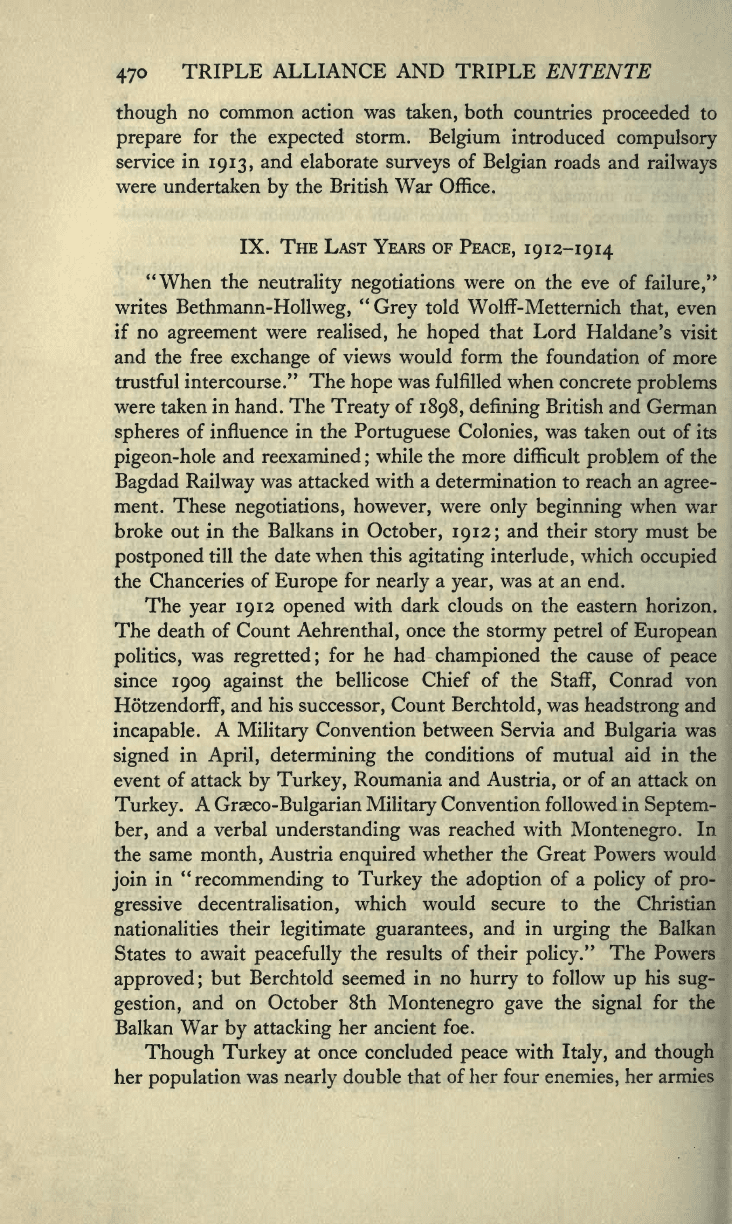
470
TRIPLE
ALLIANCE AND
TRIPLE
ENTENTE
though
no common
action
was
taken,
both
countries
proceeded
to
prepare
for
the
expected
storm.
Belgium
introduced
compulsory
service
in
1913,
and
elaborate
surveys
of
Belgian
roads and
railways
were
undertaken
by
the British
War
Office.
IX. The Last Years
of
Peace,
1912-1914
"When
the
neutrality
negotiations
were on
the
eve
of
failure,"
writes
Bethmann-Hollweg,
"
Grey
told
WolfT-Metternich
that,
even
if no
agreement
were
realised,
he
hoped
that
Lord
Haldane's
visit
and the
free
exchange
of views
would form
the
foundation of
more
trustful intercourse."
The
hope
was
fulfilled when
concrete
problems
were
taken
in
hand. The
Treaty
of
1898,
defining
British
and
German
spheres
of influence
in
the
Portuguese
Colonies,
was
taken
out
of
its
pigeon-hole
and reexamined
;
while
the
more
difficult
problem
of
the
Bagdad Railway
was
attacked with
a
determination
to
reach an
agree-
ment.
These
negotiations,
however,
were
only beginning
when war
broke
out
in the Balkans
in
October,
19
12;
and
their
story
must
be
postponed
till
the date
when this
agitating
interlude,
which
occupied
the
Chanceries
of
Europe
for
nearly
a
year,
was
at
an end.
The
year 19
12
opened
with
dark clouds on
the
eastern horizon.
The
death
of
Count
Aehrenthal,
once
the
stormy petrel
of
European
politics,
was
regretted;
for
he had
championed
the cause of
peace
since
1909
against
the
bellicose
Chief
of
the
Staff,
Conrad
von
Hotzendorff,
and
his
successor,
Count
Berchtold,
was
headstrong
and
incapable.
A
Military
Convention between Servia and
Bulgaria
was
signed
in
April, determining
the conditions
of
mutual
aid in
the
event
of
attack
by Turkey,
Roumania and
Austria,
or of an
attack
on
Turkey.
A Graeco-
Bulgarian Military
Convention
followed in
Septem-
ber,
and
a
verbal
understanding
was
reached with
Montenegro.
In
the
same
month,
Austria
enquired
whether
the
Great
Powers would
join
in
"recommending
to
Turkey
the
adoption
of
a
policy
of
pro-
gressive
decentralisation,
which
would secure
to the
Christian
nationalities their
legitimate
guarantees,
and in
urging
the
Balkan
States to
await
peacefully
the results
of
their
policy."
The Powers
approved;
but Berchtold seemed
in
no
hurry
to
follow
up
his
sug-
gestion,
and
on
October 8th
Montenegro gave
the
signal
for
the
Balkan War
by
attacking
her
ancient
foe.
Though
Turkey
at
once concluded
peace
with
Italy,
and
though
her
population
was
nearly
double
that
of her four
enemies,
her armies
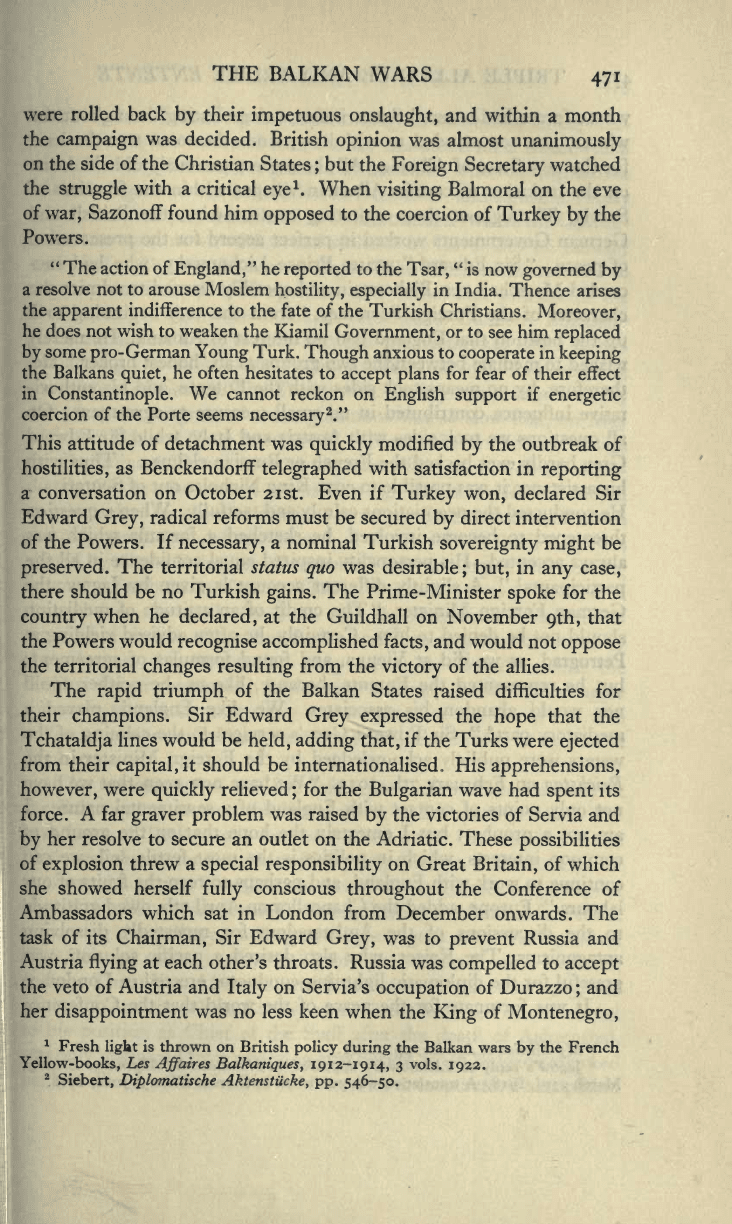
THE
BALKAN
WARS
471
were
rolled
back
by
their
impetuous
onslaught,
and within
a
month
the
campaign
was
decided.
British
opinion
was
almost
unanimously
on
the
side of
the
Christian
States
;
but
the
Foreign Secretary
watched
the
struggle
with a
critical
eye
1
. When
visiting
Balmoral
on
the eve
of
war,
Sazonoff
found him
opposed
to the
coercion of
Turkey by
the
Powers.
11
The action of
England,"
he
reported
to
the
Tsar,
"
is
now
governed
by
a resolve not
to
arouse
Moslem
hostility,
especially
in
India. Thence arises
the
apparent
indifference to
the fate of
the Turkish
Christians.
Moreover,
he does
not
wish to
weaken the
Kiamil
Government,
or to
see
him
replaced
by
some
pro-German
Young
Turk.
Though
anxious to
cooperate
in
keeping
the Balkans
quiet,
he
often
hesitates to
accept plans
for
fear of
their effect
in
Constantinople.
We
cannot reckon on
English support
if
energetic
coercion of
the Porte
seems
necessary
2
."
This
attitude
of
detachment was
quickly
modified
by
the
outbreak
of
hostilities,
as BenckendorfT
telegraphed
with
satisfaction
in
reporting
a
conversation on
October 21st. Even if
Turkey
won,
declared Sir
Edward
Grey,
radical reforms
must be secured
by
direct intervention
of
the Powers.
If
necessary,
a nominal
Turkish
sovereignty might
be
preserved.
The
territorial
status
quo
was
desirable;
but,
in
any
case,
there
should
be
no Turkish
gains.
The
Prime-Minister
spoke
for
the
country
when he
declared,
at
the
Guildhall on
November
9th,
that
the Powers
would
recognise accomplished
facts,
and would
not
oppose
the territorial
changes resulting
from
the
victory
of
the allies.
The
rapid triumph
of
the Balkan
States raised
difficulties
for
their
champions.
Sir
Edward
Grey
expressed
the
hope
that
the
Tchataldja
lines would be
held,
adding
that,
if
the Turks were
ejected
from
their
capital,
it
should be
internationalised.
His
apprehensions,
however,
were
quickly
relieved
;
for
the
Bulgarian
wave
had
spent
its
force.
A
far
graver
problem
was
raised
by
the victories
of
Servia and
by
her
resolve to secure an outlet
on
the
Adriatic.
These
possibilities
of
explosion
threw
a
special
responsibility
on
Great
Britain,
of
which
she
showed herself
fully
conscious
throughout
the Conference
of
Ambassadors which
sat
in London
from
December onwards. The
task of
its
Chairman,
Sir
Edward
Grey,
was
to
prevent
Russia
and
Austria
flying
at
each
other's
throats.
Russia
was
compelled
to
accept
the
veto
of
Austria and
Italy
on Servia's
occupation
of Durazzo
;
and
her
disappointment
was
no less keen when
the
King
of
Montenegro,
1
Fresh
light
is thrown
on British
policy during
the Balkan wars
by
the French
Yellow-books,
Les
Affaires Balkaniques,
1912-1914, 3
vols.
1922.
2
Siebert,
Diplomatische
Aktenstiicke,
pp.
546-50.
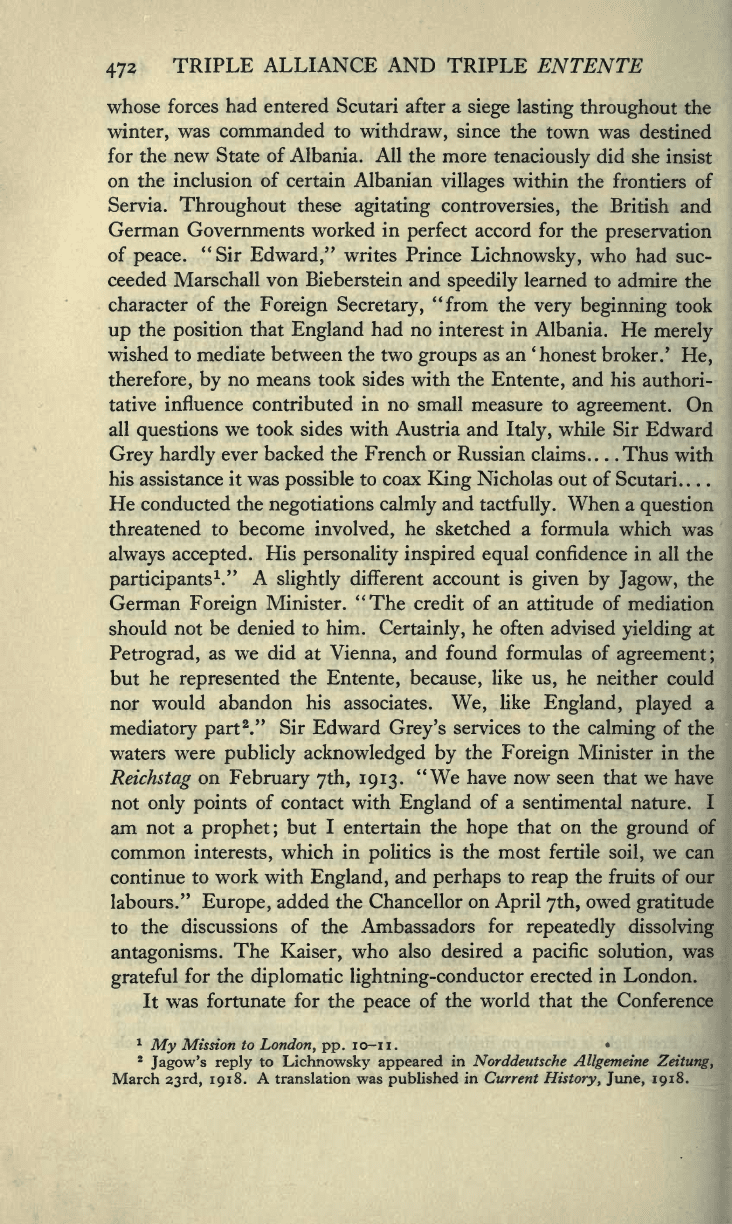
472
TRIPLE
ALLIANCE AND
TRIPLE ENTENTE
whose
forces
had
entered Scutari
after
a
siege
lasting throughout
the
winter,
was commanded to
withdraw,
since
the
town was
destined
for the
new State
of
Albania.
All
the more
tenaciously
did
she
insist
on the
inclusion
of
certain
Albanian
villages
within
the
frontiers
of
Servia.
Throughout
these
agitating
controversies,
the
British
and
German Governments worked
in
perfect
accord for
the
preservation
of
peace.
"Sir
Edward,"
writes Prince
Lichnowsky,
who
had
suc-
ceeded
Marschall
von
Bieberstein
and
speedily
learned
to
admire
the
character
of
the
Foreign
Secretary,
"from
the
very
beginning
took
up
the
position
that
England
had no
interest
in
Albania.
He
merely
wished to mediate between the two
groups
as an
'honest
broker.'
He,
therefore,
by
no
means
took
sides
with the
Entente,
and
his
authori-
tative
influence contributed
in no small
measure to
agreement.
On
all
questions
we
took
sides
with Austria
and
Italy,
while Sir
Edward
Grey hardly
ever
backed
the French
or
Russian claims
Thus
with
his assistance it
was
possible
to
coax
King
Nicholas
out
of
Scutari
He
conducted
the
negotiations
calmly
and
tactfully.
When
a
question
threatened
to
become
involved,
he
sketched
a
formula
which
was
always
accepted.
His
personality
inspired equal
confidence
in
all
the
participants
1
."
A
slightly
different account
is
given
by
Jagow,
the
German
Foreign
Minister.
"The
credit
of
an
attitude
of
mediation
should
not
be denied
to
him.
Certainly,
he
often advised
yielding
at
Petrograd,
as we did
at
Vienna,
and found formulas of
agreement;
but
he
represented
the
Entente, because,
like
us,
he
neither
could
nor would
abandon his
associates.
We,
like
England,
played
a
mediatory
part
2
." Sir Edward
Grey's
services
to the
calming
of
the
waters
were
publicly acknowledged
by
the
Foreign
Minister in
the
Reichstag
on
February
7th,
19 13.
"We
have
now seen
that we have
not
only
points
of
contact
with
England
of
a
sentimental nature.
I
am
not
a
prophet;
but
I
entertain the
hope
that
on
the
ground
of
common
interests,
which in
politics
is
the most fertile
soil,
we can
continue
to
work
with
England,
and
perhaps
to
reap
the
fruits
of
our
labours."
Europe,
added the
Chancellor
on
April 7th,
owed
gratitude
to
the
discussions of
the
Ambassadors
for
repeatedly
dissolving
antagonisms.
The
Kaiser,
who
also desired
a
pacific
solution,
was
grateful
for the
diplomatic
lightning-conductor
erected
in
London.
It
was
fortunate for
the
peace
of
the
world
that
the
Conference
1
My
Mission to
London,
pp.
10-11.
•
2
Jagow
's
reply
to
Lichnowsky
appeared
in Norddeutsche
Allgemeine Zeitung,
March
23rd, 1918.
A translation was
published
in Current
History, June, 191
8.
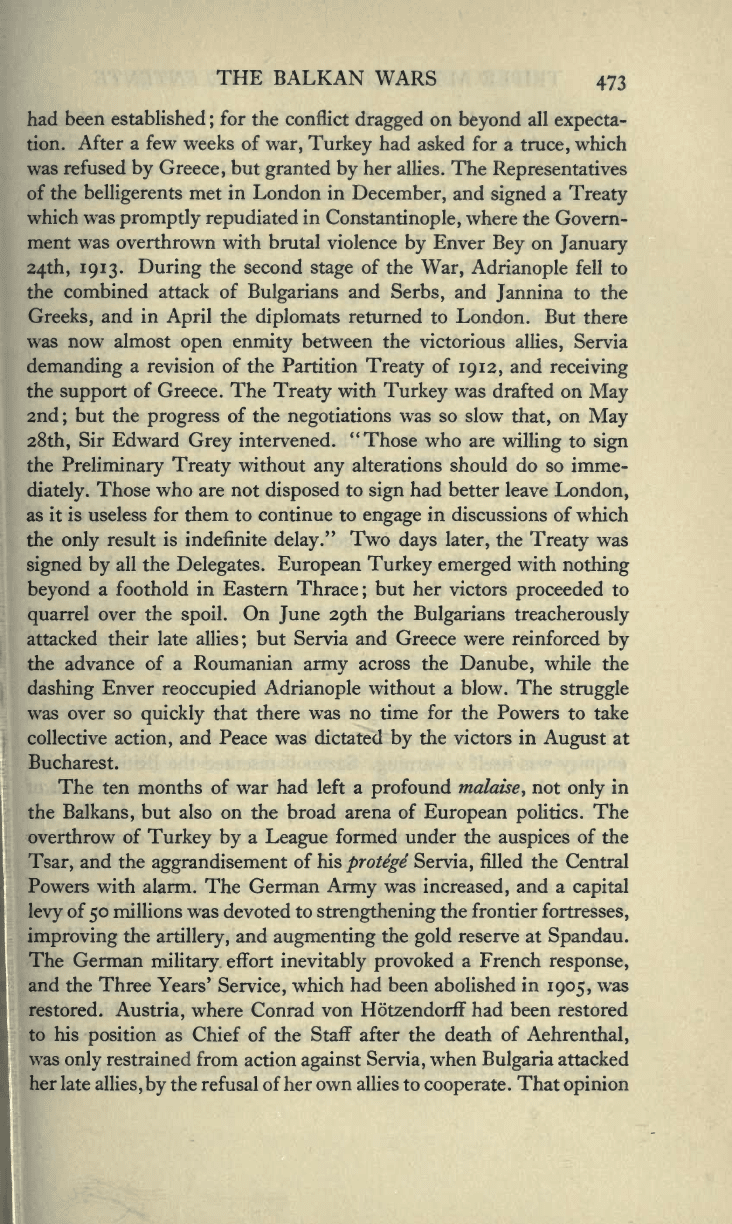
THE
BALKAN
WARS
473
had
been established
;
for
the conflict
dragged
on
beyond
all
expecta-
tion.
After
a
few weeks
of
war,
Turkey
had
asked for a
truce,
which
was
refused
by
Greece,
but
granted
by
her
allies.
The
Representatives
of the
belligerents
met
in London in
December,
and
signed
a
Treaty
which
was
promptly repudiated
in
Constantinople,
where
the
Govern-
ment
was
overthrown with
brutal violence
by
Enver
Bey
on
January
24th,
1
91 3.
During
the second
stage
of
the
War,
Adrianople
fell
to
the
combined
attack
of
Bulgarians
and
Serbs,
and
Jannina
to the
Greeks,
and
in
April
the
diplomats
returned to London.
But
there
was now
almost
open
enmity
between the
victorious
allies,
Servia
demanding
a
revision
of
the
Partition
Treaty
of
19
12,
and
receiving
the
support
of
Greece. The
Treaty
with
Turkey
was
drafted on
May
2nd
;
but
the
progress
of the
negotiations
was so slow
that,
on
May
28th,
Sir
Edward
Grey
intervened. "Those who
are
willing
to
sign
the
Preliminary Treaty
without
any
alterations should do so
imme-
diately.
Those who are
not
disposed
to
sign
had
better leave
London,
as
it
is useless for
them to continue to
engage
in
discussions
of
which
the
only
result
is
indefinite
delay."
Two
days
later,
the
Treaty
was
signed by
all the
Delegates.
European
Turkey emerged
with
nothing
beyond
a
foothold
in
Eastern
Thrace
;
but
her
victors
proceeded
to
quarrel
over the
spoil.
On
June
29th
the
Bulgarians
treacherously
attacked their late
allies;
but Servia
and
Greece were reinforced
by
the
advance
of
a Roumanian
army
across the
Danube,
while the
dashing
Enver
reoccupied
Adrianople
without a
blow.
The
struggle
was
over
so
quickly
that
there
was no
time
for
the Powers
to take
collective
action,
and Peace
was
dictated
by
the victors
in
August
at
Bucharest.
The ten months
of
war
had
left
a
profound
malaise,
not
only
in
the
Balkans,
but also
on
the
broad arena of
European politics.
The
overthrow
of
Turkey
by
a
League
formed under
the
auspices
of
the
Tsar,
and the
aggrandisement
of his
protege
Servia,
filled
the
Central
Powers with alarm.
The
German
Army
was
increased,
and a
capital
levy
of
50
millions
was devoted to
strengthening
the frontier
fortresses,
improving
the
artillery,
and
augmenting
the
gold
reserve at
Spandau.
The
German
military
effort
inevitably
provoked
a
French
response,
and the Three
Years'
Service,
which
had
been abolished
in
1905,
was
restored.
Austria,
where
Conrad
von Hotzendorff had been restored
to his
position
as
Chief of
the
Staff after
the death
of
Aehrenthal,
was
only
restrained from
action
against
Servia,
when
Bulgaria
attacked
her
late
allies,
by
the refusal of her
own allies
to
cooperate.
That
opinion

474
TRIPLE
ALLIANCE AND
TRIPLE ENTENTE
in
Russia was no
less
inflamed
than in
Germany,
Austria
and
France
was
proved
when,
in
response
to
a
request
from
Turkey
for a German
officer of
high
rank
to
reorganise
her
army,
Liman
von Sanders
was
appointed
in
November,
19
13,
to
command
the
First
Army
Corps
1
.
Sazonoff
telegraphed
to Benckendorff
that
a
German
Commander
of
an
army
corps
in
the
Turkish
capital
was
tantamount to
a German
garrison
on
the
Bosphorus,
and
suggested
that
Great Britain
and
France should
make
a
joint representation
at the
Porte
and ask for
compensations.
Sir
Edward
Grey agreed
that
a
German
garrison
at
Constantinople
could
not
be
permitted,
and
proposed
to
try
to
per-
suade
Germany
to
modify
her
plan.
Meanwhile,
he was
willing
to
join
France
and
Russia
in
asking
the Porte if
it
was
really
intended
to
give
Liman
command
of
Turkish
troops
in
the
capital.
Sazonoff,
hereupon,
asked Sir Edward
Grey
to
approve
the
following
peremptory
Note.
"The German command would
put
the
whole
diplomatic
corps
in
the
power
of
Germany,
and
the General
could
take
military
measures in
violation
of
the
Sultan's
sovereignty.
If
Germany
obtains such a
privileged position,
the
other Powers
would
have
to
consider their own
interests."
He
objected
to
the
threat,
and
suggested
that the three
Ambassadors should
make a verbal
communication to the
Porte.
"We have heard
that
a German General
has
received
a
very
far-reaching
command. We
assume
Turkey
will
do
nothing
to
jeopardise
the
independence
or
security
of
the
Straits
and
the
capital.
Other Powers
are also
interested,
and we
should
be
glad
of
information
regarding
the
contract.'
'
A
written Note
by
the
Three
Powers,
he
explained,
would be
a
very
serious
step,
while an
enquiry
was itself a
warning.
Sazonoff resented
the
British
Foreign
Secretary's
attempt
to
pour
water
into
his
wine,
and
complained
of
his
coolness "in a
matter
of
such
importance
for
us";
but
he
was
compelled
to
adopt
the milder
course.
"If
we have
changed,"
he
complained
to
Benckendorff,
"it
is due
to
want of confidence
in
English
support.
This
lack of cohesion
and
solidarity
is a source
of
lively anxiety;
for
it
constitutes
an
organic
weakness of
the
Triple
Entente,
which
always damages
us in
comparison
with the
solid
block
of
the
Triple
Alliance." On December
13th,
the
three
Ambassadors
accordingly
asked
the Grand-Vizier
for
information,
and on December
15th
the
official
reply
was received.
"The
General
is
Chief
of the
Mission,
Member
of
the War
Council,
Inspector
of
Military
Schools,
1
See
Siebert,
Diplomatische
Aktenstucke,
ch.
17;
and Liman von
Sanders,
FiinfJahre Turkei,
ch. 1.
